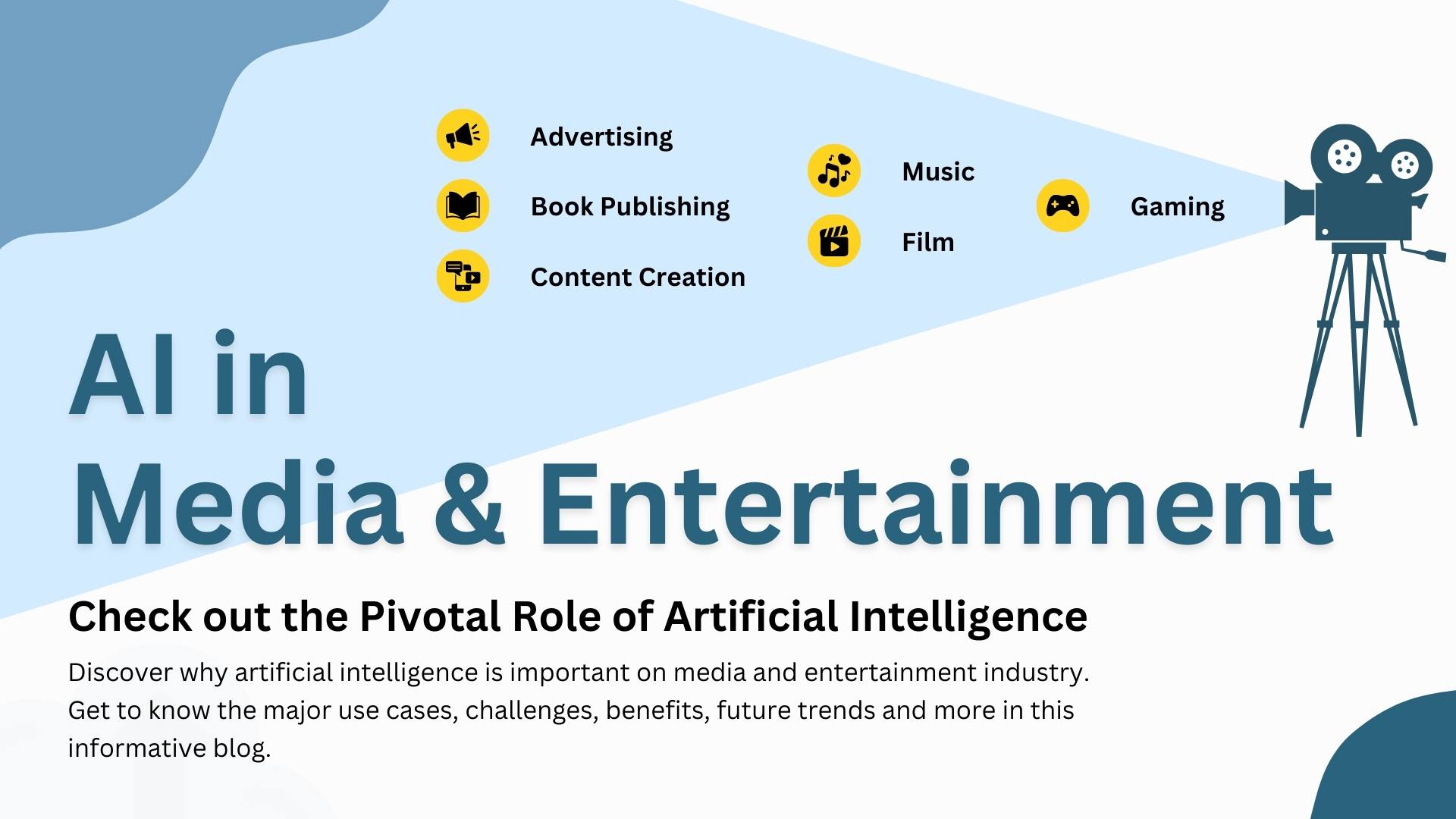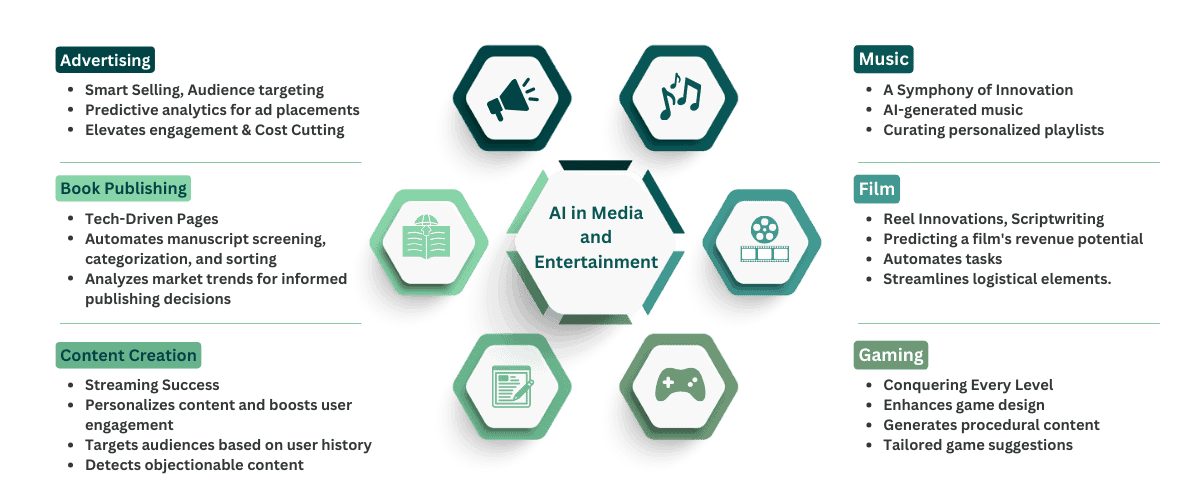
“Predicting the future isn’t magic, it’s artificial intelligence.”
– David Waters
As AI continues to make waves across industries, AI in Media and Entertainment Industry is poised to take center stage. With advancements in machine learning, natural language processing, and computer vision, AI is set to revolutionize how we consume and interact with entertainment content. From altering content creation processes to enhancing user experiences, Artificial Intelligence in Media and Entertainment is poised to redefine how we experience media, marking a paradigm shift in the entertainment landscape.
Artificial Intelligence in the Media and Entertainment – A transformation like none other
The transformative influence of Artificial Intelligence (AI) in the media and entertainment sector has been particularly pronounced over the last two years, as people increasingly turned to media entertainment during extended periods at home. For instance, AI innovations, such as subtitling, have played a crucial role in breaking linguistic barriers and allowing users to access global information.
However, AI’s applications in the entertainment industry extend beyond subtitling and reshaping creative processes in game development, movie production, and advertising. Industry giants, including Blizzard Entertainment, Walt Disney World, Google, Microsoft, and Intel, have collaborated to usher in an era of unforgettable consumer experiences.

“The global AI in the media & entertainment market, valued at USD 10.87 billion in 2021, is expected to witness remarkable expansion, projecting a CAGR of 26.9% from 2022 through 2030, according to Grand View Research.”
This blog post explores the transformative impact of Artificial Intelligence (AI) in Media and Entertainment Industry, examining the latest trends, innovations, and predictions. Real-life examples and expert insights provide a comprehensive understanding of how AI is reshaping the face of entertainment.
Cinematic masterpieces like “Ex Machina,” “Blade Runner 2049,” and “Her” vividly portray AI’s impact on imagination, raising profound questions about its future. So, it is pretty evident that what was once a work of fiction has now become our thriving reality.
Let us explore the array of use cases of AI in entertainment and media industry, delving into various domains with real-world examples and AI use cases.
AI use cases in Media and Entertainment Across Various Sectors
1. Music – The rhythm of transformation
In the realm of music, artificial intelligence (AI) unfolds a symphony of innovation. AI-generated music, orchestrated by sophisticated algorithms, delves into vast datasets of existing compositions, extracting patterns across genres to craft unique musical pieces. The emotional depth of AI-created music sparks diverse opinions, its nuances varying across genres and applications. Beyond composition, AI infiltrates the music landscape through recommendation systems, analyzing user data to curate personalized playlists based on preferences.
Notably, AI’s influence extends to audio mastering, challenging traditional practices by offering efficient and cost-effective solutions, as seen in platforms like LANDR. AI’s role in music production further expands, analyzing melodies, and rhythms, and enhancing sound quality through automated mastering services, ushering in a new era of efficiency and creativity in music creation. AI algorithms, such as those employed by Jukedeck and AIVA, are revolutionizing the music industry. These systems analyze patterns in musical data to compose original pieces, offering new creative possibilities for musicians and content creators.
2. Film – A reel of innovation
In the cinematic realm, Artificial Intelligence (AI) emerges as a transformative force, reshaping multiple facets of film production. Filmmakers strategically deploy AI for scriptwriting, leveraging machine learning algorithms to swiftly generate fresh scripts and streamline the evaluation process. In the pre-production phase, AI enhances efficiency by automating tasks, predicting task durations, suggesting filming locations and organizing logistical elements.
Notably, AI plays a pivotal role in predicting a film’s revenue potential, with major studios like Warner Bros., 20th Century Fox, and Sony Pictures employing AI platforms for box office predictions and revenue forecasting. AI extends its influence to movie editing, excelling in crafting compelling trailers and streamlining the editing process for full-length features through facial recognition technology.
Furthermore, AI ventures into film creation, exemplified by Benjamin AI’s collaboration with Ross Goodwin to produce the science fiction movie “Zone Out” in a mere 48 hours. Across scriptwriting, pre-production, revenue prediction, editing, and even film creation, AI proves to be an invaluable asset, revolutionizing the filmmaking process and optimizing outcomes. Film production is embracing AI with tools like Runway ML and IBM Watson, streamlining tasks such as video editing, color correction, and even generating realistic visual effects. AI-generated content is pushing the boundaries of storytelling and cinematic experiences.
3. Gaming – Conquering every level.
In the dynamic realm of gaming, Artificial Intelligence (AI) plays a pivotal role in both design and gameplay, elevating the gaming experience to new heights. In game design, AI enriches non-player characters (NPCs) and refines mechanics, creating realistic and challenging behaviors for an immersive player journey. AI’s prowess extends to gameplay, where it not only crafts formidable opponents but also ingeniously generates procedural content like levels and characters, ensuring a continually fresh gaming adventure. Personalization takes center stage as AI algorithms deliver tailored game suggestions, considering players’ preferences, gameplay styles, and past feedback. This predictive personalization extends to in-game content, dynamically adapting missions and challenges based on individual player behavior.
The adaptive difficulty system utilizes real-time player behavior analysis, customizing game challenges to skill levels, ensuring a finely balanced and engaging gaming experience tailored to each player’s capabilities and preferences plays a significant role in the gaming industry, enhancing game development through procedural content generation. Games like No Man’s Sky use AI algorithms to create vast, procedurally generated universes, providing unique and immersive experiences for players.
4. Advertising – Selling with Smartness
In the ever-evolving landscape of advertising, Artificial Intelligence (AI) stands as a transformative force, reshaping strategies for optimal impact. AI enhances audience targeting by analyzing extensive data, predicting behaviors, and enabling real-time personalization. Through segmentation, A/B testing, and campaign optimization, AI-driven automation streamlines marketing efforts, ensuring cost-efficiency and customer-centricity. Predictive analytics, fueled by AI, harnesses historical data to forecast consumer behavior, empowering advertisers to refine ad placements and timing for enhanced campaign effectiveness.
AI’s role extends to personalized content creation, tailoring recommendations based on individual preferences, thus elevating engagement and conversion rates. Furthermore, AI-generated content significantly expedites and economizes the creative process, offering time and cost savings. AI identifies trends, monitors brand mentions, and assesses advertising campaign effectiveness through data analytics, providing valuable insights for refining strategies. AI’s prowess in cross-channel marketing seamlessly integrates data from various channels, offering a holistic view of the customer journey. This unified perspective empowers advertisers to coordinate campaigns effectively and optimize strategies for maximum impact and engagement.
AI-driven advertising is thriving with platforms like Google AdSense and Facebook Ads utilizing machine learning to optimize targeting. Personalized ads, based on user behavior and preferences, result in more effective campaigns, maximizing engagement and conversion rates.
5. Book Publishing – A new page in tech
In the intricate world of book publishing, Artificial Intelligence (AI) emerges as a transformative force, revolutionizing key processes from manuscript submission to storytelling. In the manuscript submission and evaluation phase, AI automates initial screening, categorizes submissions, expedites sorting, enhancing efficiency. Predictive modeling, powered by AI, analyzes market trends, guiding informed publishing decisions. In editing and proofreading, AI-driven tools swiftly rectify errors, ensure adherence to style guidelines, and offer suggestions for enhanced coherence.
Book design benefits from AI’s advanced features, providing automated font suggestions, layout templates, and predictive analytics for optimized design choices. AI optimizes printing and distribution by streamlining logistics, automating inventory tracking, and targeting eBook distribution platforms for maximum reach. In marketing and promotion, AI streamlines campaign management precisely target audiences and provides real-time analytics, refining strategies for improved book visibility and sales.
Finally, in storytelling, AI analyzes datasets for character development and plot structures, while emotion detection tools fine-tune narratives for a deeper audience connection. In the realm of book publishing, AI contributes to recommendation systems, helping readers discover content tailored to their preferences. Additionally, AI tools like OpenAI’s GPT-3 are exploring the creation of AI-generated literature, posing intriguing possibilities for the future of storytelling.
6. Content Creation – Streaming success
In the dynamic landscape of content creation, Artificial Intelligence (AI) takes center stage, transforming how media and entertainment engage with their audiences. From music streaming to OTT platforms, AI’s machine learning prowess personalizes both audio and visual content, tailoring recommendations based on user preferences. This advanced personalization not only boosts user engagement but also positions companies to outperform competitors by expanding their user base.
In the realm of online advertising, AI, exemplified by platforms like Google AdSense and AdWords, precisely targets audiences based on user browsing history, ensuring maximal campaign effectiveness and conversion rates. AI’s role extends to content regulation, detecting and filtering objectionable content to comply with regulatory standards. Additionally, in content classification, AI analyzes scenes and metadata to enhance discovery, streamlining categorization and making it easier for users to find relevant content based on genre, cast, and crew.

Impact of AI in media and entertainment in Other Areas
1. Enhanced User Experience
AI’s impact on the user experience extends beyond content creation. Streaming services, such as Netflix and Spotify, leverage AI algorithms to analyze user behavior and preferences, providing personalized recommendations that keep users engaged and satisfied.
2. Virtual and Augmented Reality
Virtual and augmented reality experiences are becoming more immersive with AI integration. AI algorithms enhance storytelling by adapting narratives based on user interactions, creating dynamic and personalized content. This fusion of AI and AR/VR technologies opens new frontiers for interactive entertainment.
3. Content Monetization and Piracy Prevention
AI contributes to content monetization strategies through dynamic pricing models and subscription services. Platforms like Amazon Prime Video and Spotify leverage AI to tailor pricing plans based on user preferences, optimizing revenue streams. Simultaneously, AI-powered tools play a crucial role in detecting and preventing digital piracy and safeguarding intellectual property in the digital landscape.
Challenges and Ethical Considerations
Despite the numerous benefits, the widespread integration of AI in the Media and Entertainment industry raises challenges and ethical considerations. Issues related to privacy, bias in algorithms, and the responsible use of AI in content creation and marketing demand careful consideration.
Future Trends
The future of AI in the entertainment industry holds exciting possibilities. Ongoing trends, such as AI-generated content and advancements in virtual reality, are expected to shape the industry’s landscape. As AI technologies continue to evolve, we anticipate more innovative applications, pushing the boundaries of creativity and immersive experiences.
Final Note
In conclusion, AI’s transformative influence on the Media and Entertainment industry is undeniable. From redefining content creation processes to enhancing user experiences and optimizing marketing strategies, AI is a driving force behind the industry’s evolution. As we look to the future, the ongoing trends and emerging applications of AI promise a dynamic and captivating era for media and entertainment.
Looking to explore the wonders of AI and channelize its magic to get optimum growth in your organization? Look no further. Our AI experts at AI Global are here to guide you at every step while incorporating the uses of AI applications in your processes for maximized success and minimized hassle.
Feel free to reach out to us for all your AI exploration needs and we’d be thrilled to help!
